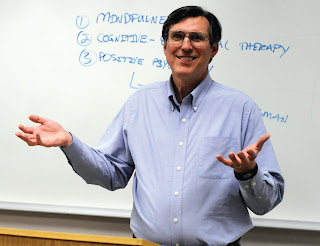
English Professor Scott Memmer and adjunct professor Julie Jacobson will give a presentation about mental health to students and faculty next semester in early October.
The presentation titled “Healthy Mind, Healthy Life: Teaching Our Students, Teaching Ourselves: Enhancing Student Learning Outcomes Through the Application of the Principles of Positive Psychology,” will introduce students and faculty to techniques that can be used to promote mental health and combat stress.
Memmer will cover three areas in the presentation, the first of which is positive psychology. Positive psychology, according to Memmer, is the in part, the study of happiness and how we make ourselves happy.
Positive psychology gained wide notice in the 1960s as an alternative method psychotherapy. Instead of the standard psychotherapy methods that focus on the negative aspects, positive psychology focuses on positive aspects of people’s lives.
Cognitive therapy is another area that will be covered in the presentation. Cognitive therapy suggests that it is our thoughts that cause our emotions, not outside factors like people or situations. Cognitive therapy aims to change the way we think, which in turn, will change our emotional response.
Memmer explained that cognitive theory is all about empowering people to do for themselves, in part, by not being so hard on themselves.
Cognitive therapy, which typically takes less time than psychotherapy, is just as effective if not more effective than anti-depressants alone, according to Memmer. Memmer is very critical of anti-depressants and other prescription drugs.
“I’m not a doctor, but there are other things we can do for ourselves,” Memmer said.
Mindfulness is the final aspect of the presentation. Mindfulness relies heavily on the philosophies of the Eastern world. A major portion of this, according to Memmer, is the simple notion that our mind and body are one. Also according to Memmer, western society has typically shunned such ideas, but studies have showed their usefulness.
Included in the concept of mindfulness are the techniques of meditation.
“I hated it at first,” Memmer said before explaining that he now uses guided meditation. “The mind will chatter, but it’s okay.”
The presentation’s goal is to get students and faculty into a better position to handle the stress of everyday life.
“Everyone has some sort of challenge or hardship that they have to face,” Memmer said.
If there’s anyone that knows about challenge and hardship, it’s Scott Memmer.
From the time Memmer was born, his mother, Doris, suffered from mental illness. That illness reached a terrible height when Memmer was in his late twenties, when Doris took her own life.
Memmer sank into a depressive state for ten years.
“I didn’t know where to turn,” he said. The concepts of positive psychology, cognitive therapy and mindfulness “may have saved my life.”
Now, Memmer is in a place to help others cope with the stress of everyday life. He doesn’t mind speaking about this past to help others.
“I’m an open book…” Memmer said. “One of the reasons I love teaching is that you can mentor people.”
As finals approach, Memmer also has some advice for students who are feeling stressed out or depressed. He advises people to get a good amount of sleep, to not isolate oneself and remain social. He advises against alcohol use. Memmer suggests reading self-help books and boosting the body’s natural endorphins by exercising.
The presentation is tentatively scheduled for Oct. 7. Students, faculty and staff members interested in attending can check the events calendar and check back here for more information starting in the fall semester as the event draws nearer.
-Kevin Kramer
